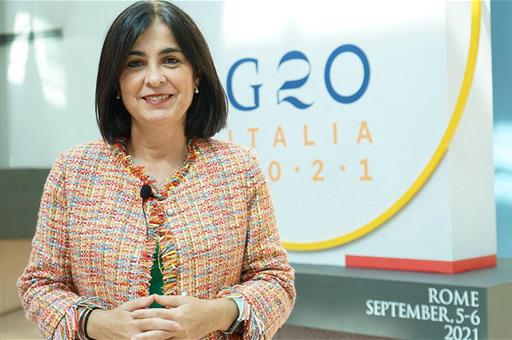Second and third sessions of G20 Rome Health meeting
Darias calls for a global push for vaccination against COVID-19
News - 2021.9.6
During the third session of the G20 Health meeting being held in Rome, Darias warned of the low vaccination coverage in these states - only 2% of their population has at least one dose - as well as the importance of improving these records because "no one is safe until everyone is safe".
"We need to act," stressed Minister Darias, who pointed out that only through a multilateral response can a global health crisis such as the current one be successfully resolved, citing some of the mechanisms and proposals being promoted by Spain, such as the ACT-Accelerator and the 'Vaccines for All' initiative.
In this regard, the minister explained that Spain is collaborating with the COVAX mechanism and other bilateral transfers, thanks to which more than 6 million doses have already been donated to developing countries.
Darias also advocated the importance of sharing knowledge, increasing production and accelerating distribution, as our country is doing with C-TAP, to ensure that no one is left behind.
Spain also supports an international treaty on pandemics to ensure greater coordination at the political level, better preparedness, risk analysis and early warning.
Minister Darias also agreed with the other G20 countries on the importance of addressing health challenges from a "One Health" perspective, which incorporates human, animal and environmental factors.
Second session of the G20
At the second session of the G20 Health meeting, Minister Darias insisted that defining common global strategies to support equitable access to vaccines, treatments and diagnostics should be an objective of all countries and stressed that the fundamental long-term goal is to achieve universal health coverage.
Darias said that only by strengthening the capacities of health systems in all countries will it be possible to face future serious cross-border health threats and that only by investing in universal public health care will it be possible to protect citizens.
To make this possible, the minister, who encouraged work along these lines, pointed out some of the lessons learned from the pandemic, such as the value of the public sector and that the best tool for facing the challenges are our health systems.
For this reason, she added, it is important to improve their capacities, mainly in terms of care, prevention, research, human resources and resilience.
In this regard, she explained that, in the case of the National Health System, Spain is working to improve epidemiological surveillance systems and preparedness for health emergencies, promoting a State Public Health Centre.
Finally, she cited good practices such as the European Vaccination Strategy, in which Spain has played an important role, and which shows the power of unity of action and the benefits of multilateral work.
In the same vein, she referred to the Antibiotic Resistance Programme, which has managed to reduce the use of veterinary antibiotics by 58%, one of the largest decreases in the EU, and the Strategic Plan for Health and the Environment, which will be announced shortly.
Non official translation





